INTRODUCTION
In the months before the election, the relatively small ECSA staff of around 30 swells to more than 5,600 to ensure the more than 1.2 million enrolled South Australians can cast their votes.
Staff need to be trained, premises rented, furniture organised, ballot papers and manuals printed, equipment ordered, stored and then delivered on time. Offices for the 47 Returning Officers must be established and arrangements made for 693 polling places and 22 pre-poll centres located in metropolitan, regional and remote areas with electoral staff on hand to make it all happen. The complexity of preparing for the Election was increased by adverse weather predictions. For polling day the Bureau of Meteorology (BOM) had forecast high temperatures and wind with gusts of up to 110 kilometres an hour, prompting a statewide severe fire danger warning from the Country Fire Service (CFS) which meant an additional degree of planning for ECSA staff.
With the possibility of such conditions during a March election, consultation with emergency services stakeholders including the CFS, BOM and SA Police had already been undertaken with contingency plans in place should any fire incident disrupt voting services by forcing the closure of polling places.
Emergency and Critical Incident Management Plans provided guidance on the steps required. Fortunately, the extreme weather forecast for polling day did not eventuate with an early change keeping temperatures well below predicted levels across the state and light showers present in many areas.

STAFFING
For the 2018 State Election staff were employed in 7,282 separate roles, compared to 7,123 roles for the 2014 election, reflecting a small increase of about 2%. The following tables show the staff categories and number of staff in each category.
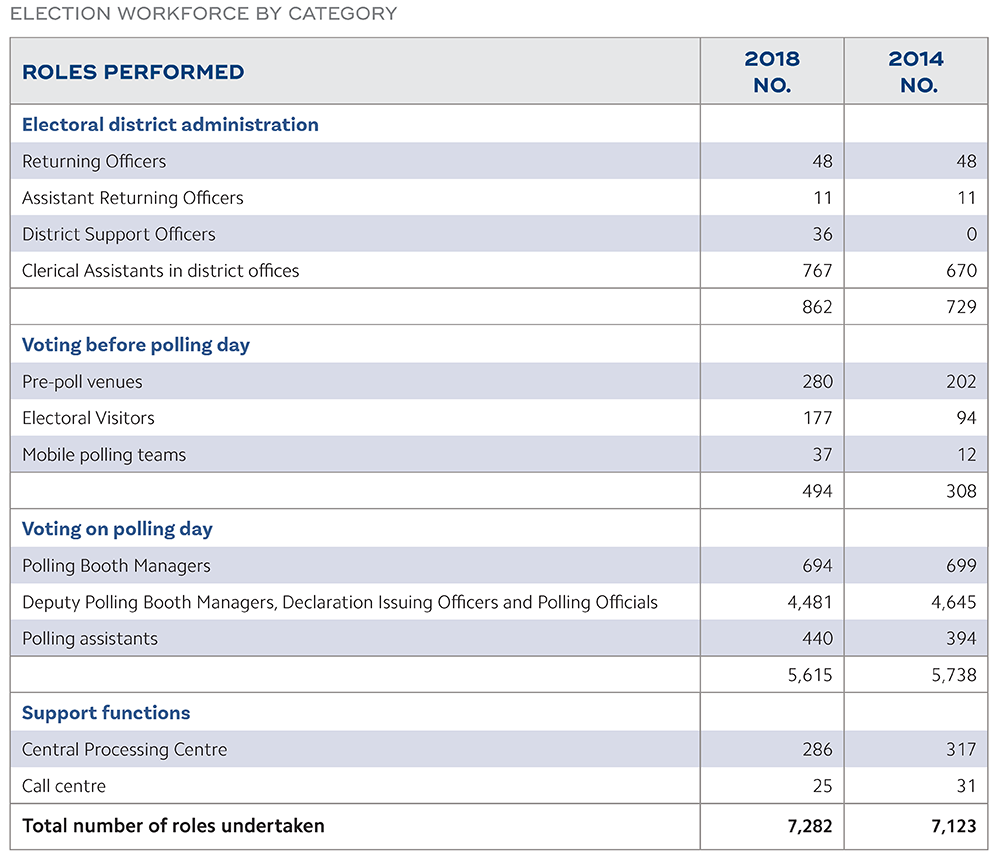
The employment system used in 2018 did not record demographic information for the election workforce such as the ability to speak languages other than English, or disability status. ECSA will ensure this information is recorded at the next State Election through the introduction of a new and improved employment system and process for engaging members of the public in the election workforce.

RETURNING OFFICERS
Returning Officers are directly responsible to
the Electoral Commissioner for the conduct of
the election for a designated House of Assembly
district and are required to perform specific
duties that cannot be delegated. These include
recruitment of polling booth managers, the
declaration of nominations and draw for position
of names on ballot papers, management of scrutiny
procedures and completion of election returns
and declaration of the poll. An additional Returning
Officer is responsible for conducting the Legislative
Council election.
All 47 House of Assembly Returning Officers were
appointed and assigned to their electoral districts
by September 2017. Among them, 25 had previously
worked as a Returning Officer at a State Election
while 22 were new to the role but in most cases
were experienced polling booth managers. To fill the
new positions, a number of individuals were invited
to provide an expression of interest in becoming
a Returning Officer for the 2018 State Election.
All applicants underwent a testing and interview
session which included practical exercises such as
conducting a count and presenting training. From
this process, the 22 new Returning Officers were
chosen.
Some key facts about Returning Officers for the
2018 State Election:
- 42 said they would be interested in working on an election again
- 60% were more than 55 years of age
- 29% were more than 65 years of age.
RETURNING OFFICER LIAISON OFFICERS
Four Returning Officer Liaison Officers were appointed to mentor and support Returning Officers, as well as to provide support and advice during rechecks and recounts and monitor election progress especially in districts where a close count was expected.
DISTRICT SUPPORT OFFICERS
In 2016 ECSA contributed, through an Electoral
Council of Australia and New Zealand working
group, to the development of a set of new Ballot
Paper Handling Guidelines. These are intended
to ensure the security of ballot papers from
production through to counting, and finally,
authorised destruction.
To help ensure these principles were properly
implemented at the 2018 State Election, and in
recognition of the need to provide Returning Officers
with additional support, ECSA recruited a new group
of senior polling officials known as District Support
Officers (DSOs). The DSOs fulfilled a similar role in
metropolitan districts to the role played since 2010
in country districts by Assistant Returning Officers.
The 36 DSOs worked closely with Returning Officers
with a particular focus on the complex logistical
elements of ballot paper management, receipt
and delivery of election materials and managing
declaration vote processing. In addition, the DSOs
provide a pool of experienced senior staff that ECSA
can draw from to fill Returning Officer positions at
future elections.

SPOTLIGHT : EX-HOLDEN STAFF ENGAGED FOR THE STATE ELECTION
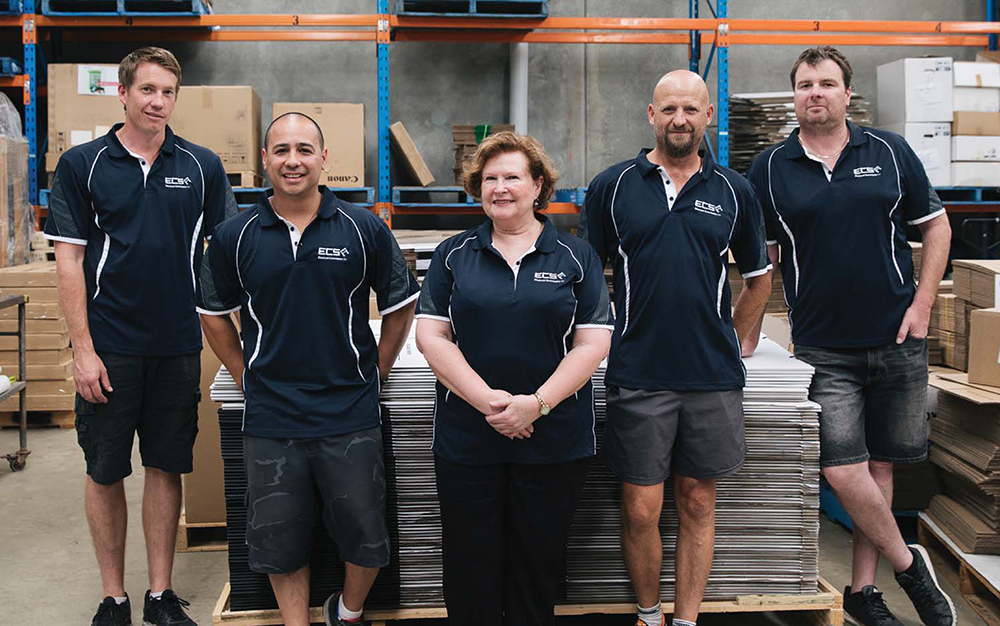
During preparations for the 2018 State Election the closure of the Holden plant in Elizabeth presented an opportunity for ECSA to engage ex-Holden workers to assist with the election. In October 2017 ECSA contacted the Holden Transition Centre and secured nine former Holden staff.
The skills and experience the nine staff had developed over many years at Holden proved to be highly transferable to election work. Each of the staff made an outstanding contribution to the delivery of the election across a range of vital tasks including transport, logistics, sorting and processing, kit packing and stock management.
One example is Tom Wetherall, who worked at Holden for 15 years including as a Work Group Leader supervising the production line – skills he ably transferred to his role as ECSA’s Warehouse Supervisor coordinating the assembly and packing of all the materials sent out to polling locations around the state.
Tom enjoyed the camaraderie of election work: “The best part of working for ECSA is the way people band together and get the job done. There were big hours and a thousand different things to do but we always worked as a team and looked out for each other and got a good result. Sometimes it was a madhouse but I’d do it again in a heartbeat.”

ENGAGEMENT OF POLLING STAFF – TRANSPARENCY AND ACCOUNTABILITY
ECSA has a strong focus on ensuring the integrity, neutrality and professionalism of its election workforce and implemented two new checks to establish the suitability of staff for employment at the 2018 State Election:- National Police Checks were required for senior staff and anyone directly involved with vulnerable people, such as residents of nursing homes and hospitals. Five individuals were excluded from employment as the result of 294 National Police Checks completed. These exclusions were for multiple driving and drinkdriving offences for one individual; multiple disorderly behaviour and alcohol-related offences for another; and various assault offences for the other three individuals.
- All Polling Booth Managers and Pre-Poll Voting Centre Managers – 712 in total – were required to provide an integrity declaration attesting to their good character and suitability for their duties completed by an ECSA staff member, a Returning Officer or an authorised person who had known them for more than 12 months.
FAST FACTS

MODERNISING ELECTORAL SERVICES : CAPACITY TO SUCCEED
A comparison of staffing levels across Australian electoral commissions shows that ECSA has a relatively small head office staff count with just 28.4 full time equivalent employees (FTEs). Our closest counterpart in terms of elector numbers, the Western Australian Electoral Commission, had 45 FTEs at the time of its State Election in 2017.The small number of permanent positions at ECSA impacts negatively on staff, who are required to work considerable hours for a period of up to 18 months, juggling multiple projects. Almost half of ECSA head office staff surveyed said the pressures of their role did not allow them to achieve a work-life balance and the majority of staff had to undertake significant levels of overtime to achieve ECSA targets.
ECSA must ensure it has sufficient staffing capacity, expertise and the best possible organisational structure to meet the challenge of running elections in a sustainable manner and deliver the program of modernisation outlined in this report.
To achieve these aims ECSA will undertake an organisational design review of its structure and staffing numbers in 2019.
TRAINING
A key part of preparing ECSA’s temporary election workforce for the 2018 State Election was the training of the thousands of polling staff engaged to work around the state.In-person training was mandatory for 138 Returning Officers, Assistant Returning Officers, District Support Officers, Polling Booth Managers and deputies, Pre-poll Managers and deputies, and Declaration Vote Issuing Officers. Online training sessions were available for all other polling and support staff. For the first time, training was also delivered to Aboriginal Information Officers in the APY Lands (see Chapter Three for more information ).
Training covered the full range of voting processes and scrutiny and counting of ballot papers. All training materials were developed in-house through a consultation process with subject matter experts across ECSA.
Although ECSA’s staff surveys found overall satisfaction with training, with 92.8% of staff saying the training helped them to understand their roles and 91.7% saying it helped them to confidently undertake their tasks, ECSA will pursue the sourcing of a new interactive learning platform accessible on mobile and tablet devices and capable of handling large volumes of data and providing real-time reporting on training completion.

MODERNISING ELECTORAL SERVICES : A BETTER LEARNING MANAGEMENT SYSTEM
Requiring staff to complete role-specific training is vital to ensuring ECSA’s election workforce are capable of understanding and completing their required duties. Effective training delivery requires a capable online learning management system.Unfortunately, ECSA’s online training system has reached the end of its functional life and was subject to significant criticism by senior staff for its failure to support monitoring of online training completion by their polling staff, amongst other shortcomings
In early 2019 ECSA will commence a process to identify a suitable new learning management system for training our election workforce. The new system can also be used to offer training and professional development to ECSA permanent staff on subjects such as risk management, project management and cultural awareness.
ACCOMMODATION
In the 12 months preceding the election, ECSA
undertook the challenging task of securing 744
premises in metropolitan Adelaide and across the
state to accommodate Returning Officers, pre-poll
voting centres, polling booths, the call centre and the
central processing centre.
The four-year election cycle poses a significant
challenge in that the required premises must be
identified and new leases negotiated at each
election with a range of stakeholders, building
owners and agents.
Accommodation for Returning Officers must
allow for a variety of tasks including the training of
electoral officials, receipt and dispatch of election
materials, counting of votes, and interaction with
candidates and the public. In regional areas, premises
were required to be in the closest major regional
centre associated with the relevant electoral district.
Returning Officer premises were leased for two
months where possible, as a way of keeping costs
under control. However, this placed considerable
pressure on transport and logistics activities to
ensure all premises were cleared of office furniture,
equipment and election materials within two weeks
of polling day.

POLLING PLACE SELECTION
For the 2018 State Election there were 693 polling
booths established in 611 locations, six fewer than
in 2014. 79 were shared polling booths located near
electoral district boundaries. Shared locations allow
for the issuing of ordinary votes for more than one
district. ECSA established pre-poll centres in
22 locations, with nine co-located in Returning
Officer premises.
The complex process of identifying and selecting
polling booth locations began almost a year before
polling day. It included consideration of the booth
locations used at the 2014 State Election, booths
used by the AEC for the 2016 federal election, as
well as analysis of the likely impacts of the EDBC’s
changes to House of Assembly district boundaries
and predicted voter turnout. Once this process
was completed, a list of recommended locations
was provided to Returning Officers who visited the
locations to conduct an accessibility audit and
ensure the venues were able to cater for predicted
voter turnout. While there was a focus on securing
fully accessible locations wherever possible, in some
instances – particularly in smaller regional towns
– ECSA was constrained by the limited choices
available. This was partly compounded by the
reluctance of the commercial property market to
agree to the short-term leases required. As a result,
several premises were neither the optimal size nor
standard required.
Identifying suitable pre-poll voting centre premises
proved to be a challenge at the 2018 State Election,
not only because of the shortness of the leases
required, but also the difficulty in finding suitably
accessible locations. A notable example was the
difficulties experienced in identifying a location
for a centre in the main hub of Jetty Road, Glenelg.
Despite our best efforts, the lack of availability forced
ECSA to settle for a premise located on a side street,
with less than ideal facilities, which contributed to
lengthy queues of electors during pre-poll voting.
A further example was the choice of premises on
Glynburn Road, Glynde. Despite receiving assurances
from building owners that renovation work would
be completed prior to the commencement of
pre-poll voting on 5 March, a significant portion of
the building works remained incomplete, including
the front entrance. This severely impacted on the
space available for ECSA to offer voting services and
contributed to longer than desired waiting times and
confusion for some electors.
ECSA’s preferred option for polling booth locations is
public schools due to the fact they are conveniently
located, highly accessible and are available to ECSA
at significantly reduced cost. At the 2018 State
Election, 57.3% of all polling booths were located
at schools, with the remaining 42.7% consisting of
town, church and RSL halls, community centres,
recreation centres and even a handful of bowling
clubs. In total 96% of all polling day booths were
either fully accessible or accessible with assistance.

MATERIALS
Election materials were distributed to Returning Officer (RO) district offices and polling places in multiple stages prior to the election. Office materials for RO offices were delivered in late January, while election materials such as certified rolls, manuals, electoral roll look up devices and ballot papers were delivered to pre-poll locations in early March. Materials for polling booths were assembled and packed as kits specific to each location and then delivered to RO offices ready for further distribution to booth managers on the evening before polling day.Additional deliveries of the extensive polling day cardboard equipment for each of the 693 polling booths, comprising voting screens and queue management material were completed during the week leading up to polling day. In total there were approximately 1,600 deliveries between ECSA’s packing centre, RO offices and polling places between January and March 2018.
Some of the materials delivered to polling booths are illustrated below :
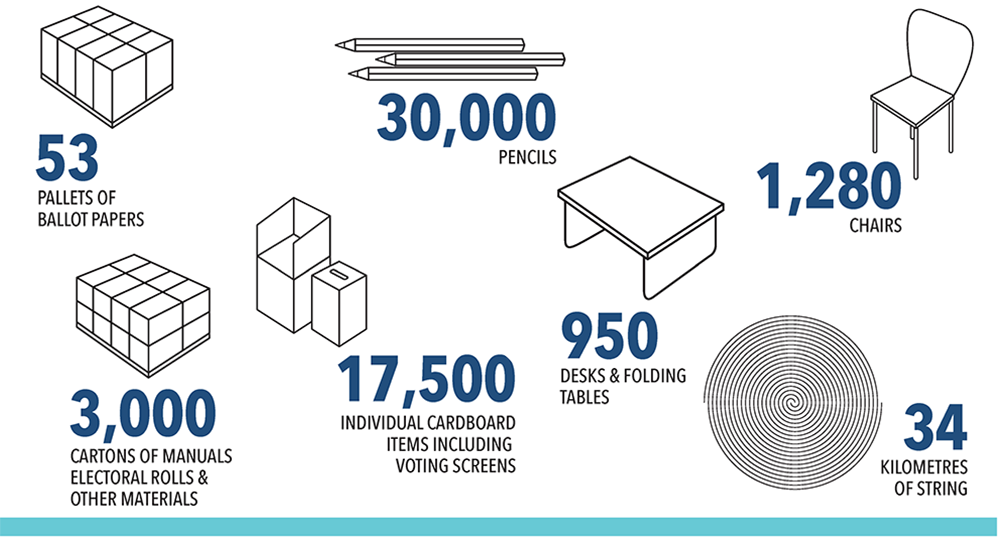

SPOTLIGHT : CORALIE LOWE – ELECTION VETERAN
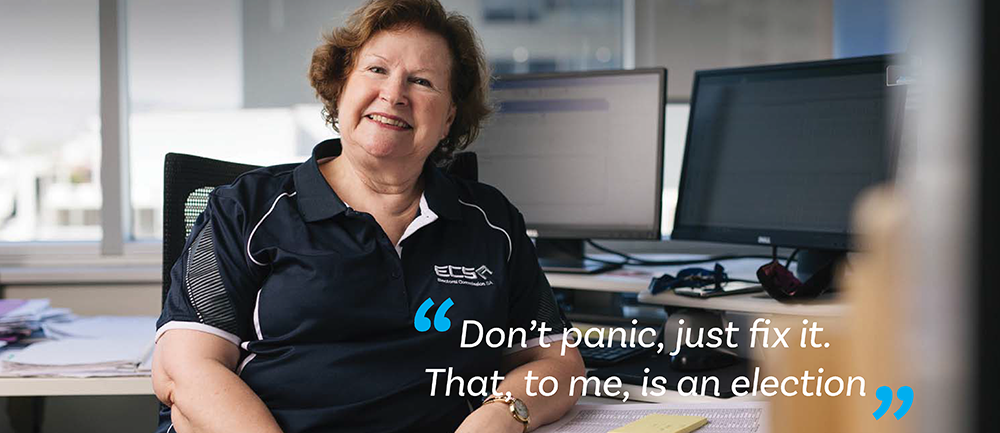
If staging a state election is South Australia’s biggest logistical exercise, then Coralie Lowe is the person you want calling the shots. The former dental nurse has been working on elections since 1997 and became a full-time employee in ECSA’s Elections Branch in 2004.
For the past three elections Coralie has been at the centre of logistics planning for state elections: that is, what needs to be where, when and in what quantity. This involves ensuring that sufficient quantities of voting screens, ballot boxes, stationery and a multitude of other items like computing equipment are packed and delivered in a timely and cost-effective manner for use in polling places across the state.
After the election, Coralie and her team at the CPC need to make sure everything is returned, stored or disposed of once it is no longer needed.
“You plan your campaign by establishing what is needed and when it is needed, but it’s a big challenge because there are so many things that are out of your control,” Coralie says.
“I always think of it as a giant jigsaw puzzle where each branch of the office is part of the puzzle. No one branch can conduct the election alone; we each play our role, but we also need to collaborate to bring it all together.”
“It is not only the now, though, it’s important to be constantly thinking ahead of what needs to start happening and what resources can be called upon at the last minute if there are any issues. In an election there are always things that don’t go to plan, you need to be adaptable and flexible, don’t panic, just fix it. That, to me, is an election.”
One of the things Coralie enjoys the most about her work is being part of a team of dedicated likeminded people working above and beyond the call to get the job done.
“Our office is full of people who wouldn’t consider going home at five o’clock, they like the challenge and they want to see the job done well,” she says. “We are all election tragics!”
ASSESSING ELECTION READINESS
State elections are always complex logistical
undertakings. ECSA’s planning and preparation
for the 2018 State Election commenced at the
conclusion of the 2014 Election, coordinated by
an Election Delivery Committee (EDC) chaired by
the Electoral Commissioner. To provide additional
assurance that ECSA was adequately prepared,
a request was made to the Western Australian
Electoral Commission (WAEC) to critically review
ECSA’s election planning and system readiness.
In December 2017, the WAEC Deputy Electoral
Commissioner Chris Avent travelled to Adelaide.
To facilitate his review, Mr Avent was granted
access to every part of ECSA’s election preparations,
including attending EDC meetings, reviewing
project plans, and interviewing numerous ECSA
staff. Mr Avent provided ECSA with valuable
recommendations, along with helpful advice to
many ECSA staff.
ECSA acknowledges and thanks Mr Avent and
the WAEC for making a significant and valuable
contribution to ECSA’s election readiness.
INTERSTATE SECONDMENTS
ECSA participates in a reciprocal agreement with
interstate electoral commissions for seconding staff
to assist with state election delivery. This agreement
provides ECSA with experienced electoral staff from
other commissions while also offering development
opportunities for ECSA staff who travel to other
jurisdictions to assist when requested.
A total of 20 electoral staff from six electoral
commissions were seconded to assist with the
2018 State Election for periods ranging from two
days to more than 30 days. These staff brought
with them valuable skills and experience and made
an outstanding contribution to the successful
delivery of the Election. Staff involved were from
the Australian Electoral Commission, Victorian
Electoral Commission, Electoral Commission NSW,
Electoral Commission of Queensland, ACT Electoral
Commission and Western Australian Electoral
Commission.
CENTRAL PROCESSING CENTRE (CPC)
ECSA secured office and warehouse facilities of around 1,700 sqm at Wingfield in Adelaide’s northwestern suburbs to provide suitable premises for:
- Preparation, distribution and receipt of election materials
- Staff briefings and training sessions
- ICT equipment testing and setup
- Processing of postal and declaration votes
- Receipt of all election materials after polling day
- Storage of sensitive equipment and electoral materials at the completion of the election.

BALLOT PAPER PRODUCTION
Once nominations closed and the ballot draws had
been conducted on 27 February 2018 the printing of
ballot papers was able to commence.
Immediately following the ballot draws, the master
ballot paper templates were provided to the printer.
The printing of ballot papers was conducted within
tight timeframes with ballots for each House
of Assembly district and the Legislative Council
required the following morning for distribution
to overseas pre-poll centres and posting to the
Registered Declaration Voters and other electors
who had applied for a postal vote by this date.
In total, 2,752,500 ballot papers were produced
for the 47 House of Assembly districts. For the
Legislative Council 1,655,000 ballot papers were
produced. To ensure ballot papers were free from
errors, ECSA staff undertook a comprehensive fourstage
proofing process.
Security was paramount for the transport and
storage of ballot papers, particularly with the return
of ballot materials to the CPC.

ICT PREPARATION
Planning of ICT development projects for the 2018
State Election was well underway by early 2017, with
an ICT Steering Committee comprising the Electoral
Commissioner, Deputy Electoral Commissioner
and other senior staff formed to monitor and guide
project progress and completion.
In all, the Committee oversaw the successful delivery
of six major development projects and seven minor
ICT projects within a relatively short time frame.
Several of the projects involved updates to existing
systems, which required them to be rebuilt as webbased
platforms and developed for long-term use.
The following six key ICT software projects were
delivered for the election:
- Funding and disclosure portal
For lodgement of returns under the new funding and disclosure scheme (for more information see Chapter Six) a brand new funding and disclosure portal was developed. The portal was the culmination of months of hard work in design and testing. ECSA launched it on 17 January 2018, in time for the first designated period lodgement for the State Election. ECSA staff provided training and a great deal of help desk assistance to users. - State Election Management System
Developed internally by ECSA and completed in February 2018, the State Election Management System consists of two components: StEMS which collates data for districts and polling places, including office and polling locations, and assists with allocation of staff and equipment; and the candidate system which collates all candidate information and is used to prepare outputs including ballot draws and ballot paper templates, as well as input data for counting and results processing. -
Declaration Vote Module (DVM)
The DVM system was developed by ECSA and launched in January 2018. Among its functions it assists with postal voting by recording applications, preparing postal vote declarations, processing returned postal and absent declaration envelopes. - Pre-poll system
The pre-poll system was designed to be used across all pre-poll voting centres to assist with declaration voting including looking up electors, vote issuing, envelope printing, system administration and reporting. - Deliveries system
The deliveries system was used to record and report on declaration vote batches which are boxed for redistribution and delivery to Returning Officers. It was developed to be integrated into the DVM. - Returning Officer system
The Returning Officer system identifies staff in various roles and provides a communication channel across ECSA and district offices. It also collects onboarding information for the casual staff employed during the election period.
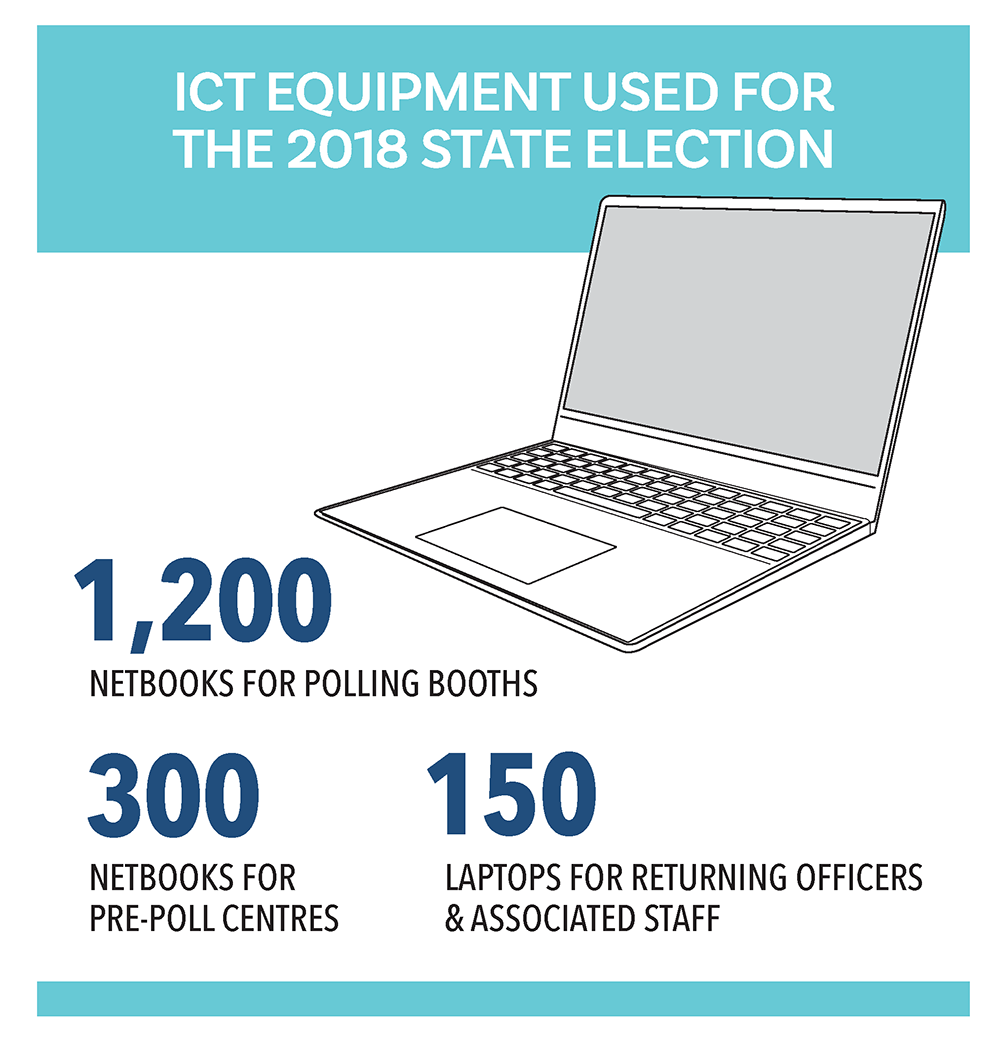
SECURE ELECTION SYSTEMS
Prior to use during the election period, ECSA engaged an independent third party to test externally facing systems in order to ensure their security and integrity.The testing included:
- Penetration testing of the ECSA website
- Penetration testing of the Funding and Disclosure Portal
- Easy Vote Application Code Review
- Declaration Vote Management web application vulnerability assessment.
ECSA met with representatives from the Australian Cyber Security Commission (ACSC) prior to the Election to discuss potential issues and identify how the ACSC would be able to provide support if required. The Electoral Commissioner and ECSA ICT Project Manager also met with NEC and Service SA to discuss and to review security arrangements and opportunities for additional support during the election period.
The 2016 US presidential election put a spotlight on cyber security, particularly for democracies with growing ICT reliance and ECSA put a strong focus on cyber security for the 2018 State Election.
The ECSA network sits within the SA Government Statenet environment and because of this had internal system reviews and received support from the Office for Cyber Security and the Chief Information Security Officer. There were no cyber security incidents identified at any stage of the Election.
MODERNISING ELECTORAL SERVICES : ICT HARDWARE
Conducting state elections in the 21st century increasingly requires large amounts of ICT hardware. For the 2018 State Election this included laptops, desktops, monitors, scanners, printers, wi-fi routers, servers, and mobile phones.Given the cyclical nature of ECSA’s need for ICT hardware, it can be challenging and expensive to ensure a timely rollout of equipment with the required software and capability. In 2018 and at previous elections ECSA had some success in borrowing hardware from other electoral commissions and SA government agencies, but improved solutions need to be identified to prepare for future elections.
To support plans for a substantive technological shift from paper-based practices towards automated processes, ECSA will undertake a comprehensive hardware needs analysis to identify ICT requirements for the 2022 and 2026 State Elections. The analysis will consider technology advances such as 5G and will culminate in a cost-benefit analysis to assess how ECSA should obtain access to sufficient suitable hardware. As part of this, ECSA will investigate how it can contribute to combined hardware purchases made by other Australian commissions and a national device pool. Any identified pathway forward is likely to require a significant investment in ECSA’s ICT hardware capability to ensure ECSA is able to continue to meet community expectations and match the level of innovation already in place in other jurisdictions.
MODERNISING ELECTORAL SERVICES : PROJECT MANAGEMENT SOFTWARE
The management of elections is an intricate process, involving hundreds of separate tasks, the use of a diverse range of resources and the employment of thousands of short-term staff. To run elections smoothly and ensure that the multitude of tasks, resources and people come together without incident requires advanced project management techniques supported by high quality project management software (PMS).ECSA’s existing planning software is outdated and no longer capable of performing some of the functions most modern electoral management bodies consider essential for preparing for major electoral events. These include resource management, budget reporting, tracking staff and team tasks, visibility over workloads, team collaboration, or the generation of task scheduling.
ECSA will identify a suitable project management system capable not only of aiding in planning for future state and council elections, but of storing data and insights from one election to the next, which will in turn drive optimisation of future electoral services.